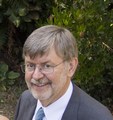Moving Towards Sustainable Watershed Systems: “We need to re-learn basically ‘how we think’, using both the right and left hemispheres of our brain,” says Eva Kras, author of THE BLOCKAGE

“Short-term thinking governs much of what we do. In many organizations, the long-term view has somehow become excluded. Both ways of thinking are important, but the sad part is that we have convinced ourselves that the Left Hemisphere can do EVERYTHING. The new research by Ian McGilchrist now ‘turns the table’ because it demonstrates the true and indispensable role of the Right Hemisphere for ALL sustainable development work,” states Eva Kras.










